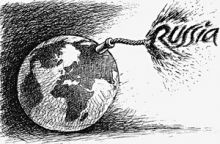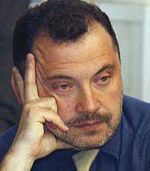Recent events in the world – the series of revolutions called Arab Sping in North Africa and in the Middle East, as well as mass protests in Russia, which were called “White Revolution” in the West – have greatly scared Russian authorities. Another proof of this is the creation of the Expert Advisory Board for Counteracting the “Color Revolutions” in the State Duma. Russian newspaper Kommersant reported on April 9 with reference to Oleg Lebedev, committee’s deputy head and member of the United Russia Party, the new agency is created as a part of the Duma Committee on CIS Affairs in order to “protect the interests of our country and its allies.”
One of the experts involved in the creation of the Board, in an interview to Kommersant described it as a “counter-revolutionary think tank.” According to him, its members will discuss “the role of foreign NGOs as an instrument of color revolutions,” “role of network technologies in organization of protest movement,” the influence of blogosphere and social networks on the masses, and methods of counteracting the revolutionary movement as a whole.
Dmitry Sablin, First Deputy Chairman of the Committee on CIS Affairs, said that the expert group will also deal with the situation of our compatriots abroad and the “influence of other countries on the CIS countries.”
The newspaper notes that the Russian authorities are trying to develop a systemic approach in confronting the “color revolutions” and the expansion of the former Soviet Union. In early March the former MP Konstantin Kosachev was appointed the head of Rossotrudnichestvo. Kosachev plans to turn the agency into an effective tool of foreign policy. According to Kommersant, there was a discussion about changing the name of the agency to the more harmonious and recognizable following the model of the American USAID (US Agency for International Development).
Let us remind the reader that the fight against the “orange” threat became one of the central topics of Vladimir Putin’s presidential campaign. The rally in his support that took place on Poklonnaya Hill on February 4 was held to the “antiorange” slogans. The political scientist Sergey Kurginyan was the ideologist of “antiorange” movement.
Putin himself has told on numerous occasions that he would not allow the “export of revolution” of the Libyan scenario. According to him, to prevent such scenario Russians have to develop democratic institutions and, at the same time, they have to “secure their sovereignty” – “not to let anyone poke his nose into their affairs.”
Konstantin Zatulin, director of the CIS Institute supports the idea of creating such think tank. He told Kommersant the following: “Russia has a thousand ways and opportunities to spread its influence on the territory of the former Soviet Union. Unfortunately, quite often Moscow prefers the most brutal methods and does not pay attention to the costs, as a result it undermines its influence in this key region for us.”
According to experts, the activities of Moscow in this sphere are associated with a number of objective difficulties. According to Fyodor Lukyanov, chief editor of the magazine Russia in Global Affairs the problem of Russia, in contrast to its Western geopolitical rivals, is the lack of attractive image. “On the one hand, this is an enormous problem. On the other hand, with all faults and disadvantages of the Russian model Russia is still more advanced than most of the post-Soviet countries. We need to take advantage of this,” said Lukyanov.
However, the Russian newspaper admits that the search for a universal algorithm of preventing “color revolutions” can turn into a banal crackdown.
The Day asked Ukrainian and Russian experts to comment on the State Duma counter-revolutionary initiative.
“This is going back to the time of the cold war”
Oleh RYBACHUK, head of the NGO “Center UA”:
“This shows the obvious fear of the non-competitive system that is facing what it calls ‘color revolutions,’ that is, the protests of ‘white ribbons,’ which seriously alarmed the President Vladimir Putin and generally the whole system, which has been formed during the time of his ruling. Besides, Putin and his team were certain that they stand on secure foundation, unlike other countries where the ‘pernicious influence of the West’ is spread, because Russia has its uniting idea of the ‘great and powerful state.’ The doctrine of self-restoration of Russia was actually built on the attempts of historical reanimation of Joseph Stalin and Peter the Great. But the events of the last couple of months, when both in Moscow and in Saint Petersburg people openly challenged the system became a serious test for Russian authorities.
“I am surprised with the primitivism of the Russian authorities’ reaction. It shows that the leaders in the Kremlin drew no conclusions from the recent events in the world. They did not understand there that the vertical of power – is an absolutely hopeless subject and that now only those countries survive that are strongly lean on social support and conduct a dialogue with society.
“An attempt of isolationism is impossible in Russia because it also depends on the rest of the world. Russian authorities believe that petrodollars will help them to keep this system, but experience shows that it just won’t work this way. People, who have a little more of material goods also demand more freedom. That is why this Board for Counteracting ‘Color Revolutions’ is a ‘witch hunt’ – a step from the 20th if not the 19th century. This remarkable fact is contrary to many of the roundtable discussions which I attended in Europe, where the ambassadors of the Russian Federation appealed to the West and said: ‘We are one blood: we have the same values and we all share them! We all want to see the democratic future and the Common European Home.’ I have always been surprised with such ‘European’ rhetoric but when it comes to a moment of truth ‘wild’ formations like the Committee for Counteracting ‘Color Revolutions’ are created. Obviously, some campaign has to start with its creation because it needs to have something to work on. But what will it fight against? In Moscow there were protests of middle class people.
“How is the Kremlin supposed to fight the most independent part of the society? What sanctions could be applied? How is the government going to implement the tactic of ‘iron curtain’ in the 21st century, because it would be logical to dissociate itself from the ‘pernicious influence of the West’ and also such countries as Ukraine, Georgia, and Moldova where the demands of democratization are expressed louder and louder? How are they supposed to protect themselves from all of this? Will they choose informational blockade and will shut down the Internet? In my opinion, it means going back to the time of the Cold War, which was lost by the Soviet Union. I am sure that the fight against the ‘color revolutions’ will also be lost by Putin’s Russia.
“Europe is not homogeneous now, just like the current presidential campaign in the United States with its ‘reset policy,’ which cracked. But in general, it is hard to say that Europe would make any decisive statements against Putin. I don’t see anyone there who could lead this process.”
“The declared statement simply demonstrates caveman way of thinking and a complex”
Nikolay PETROV, member of the Research Council of the Moscow Carnegie Center:
“I think that it demonstrates caveman nature of the current State Duma or, at least, its part which is characterized by being behind the age and unwilling to think how it might look. The Committee for the CIS Affairs is actually one of those poor and conservative committees in the State Duma. This is the Committee where the mentioned Council is being created. And here I see nothing but an empty declaration of the people, who are constantly concerned with the idea that it is the bad actions from the outside that threaten the stability of the country. It seems to me that there is no meaningful news in this. If the parliament, which lacks expert opinion in its work, will begin to strengthen its expert presence under such pretext, I have no problem with that. However, I think that the role of the State Duma as a whole, especially the role of the Committee for the CIS Affairs, and even more so the role of this Council of the Committee are not the kind of structures that could be and should be discussed.
“Can we consider this initiative of the Committee for the CIS Affairs unpromising? It is hard to say. Nevertheless, I think that there is a problem and the problem is quite serious. The problem is in how Russia acts and how it appears in the CIS. If the Parliament really worked more seriously on that, it would have been only be useful. But the declared statement only demonstrates caveman way of thinking and an inferiority complex. I think, there is nothing more to it. There is a problem and it is very serious. The problem is that there is practically no analytical work conducted on the CIS countries.
“When we look for experts on Ukraine, it turns out that there is nobody in Moscow who actually works with what is happening in Ukrainian politics and economics. And if there is somebody who does, they appear to be such extremely ideological and marginalized in terms of expert opinion structures like CIS Institute.
“What concerns the possible reaction of the West to this counter-revolutionary initiative of the Duma members, I think that the fact that some Committee with little substance to it with pretty conservative members creates some structure is not worth any significant reaction. If they come out with some real ideas and results then there could be some reaction to it. However, in many years of the Committee’s existence I do not remember any interesting and meaningful ideas coming from it.”










